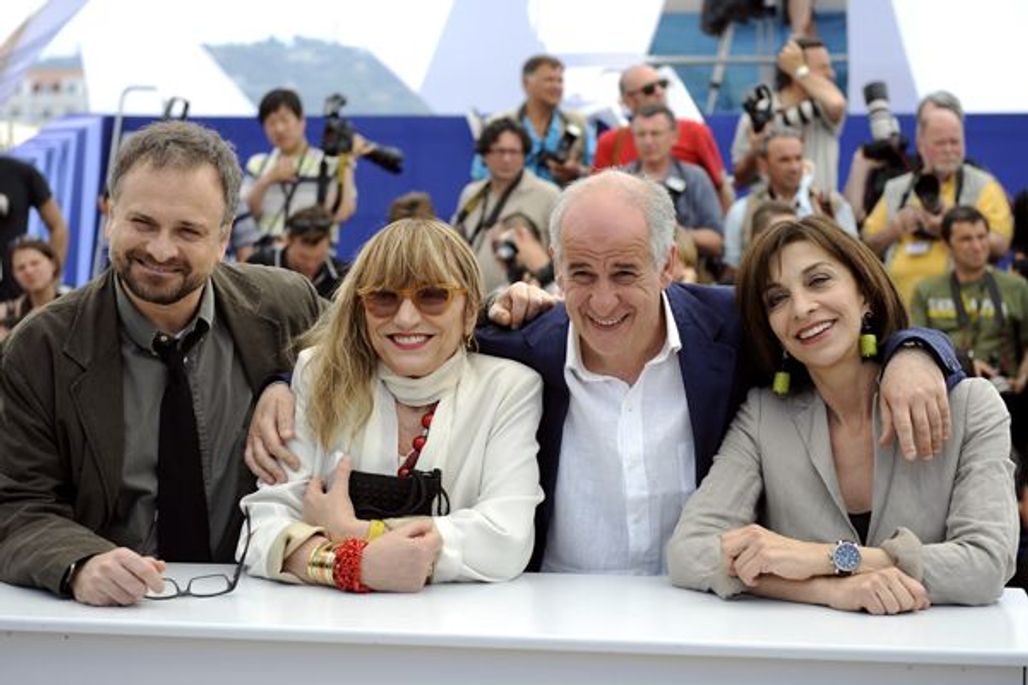
Press Conference: “Il Divo”

For the presentation of Il Divo in Competition, Italian director Paolo Sorrentino met the press, flanked by actors Anna Bonaiuto, Piera Degli Esposti, and Toni Servillo, as well as producers Fabio Conversi, Nicola Giuliano, and Andrea Occhipinti. Excerpts follow:
Paolo Sorrentino, on putting together financial backing for the film:
“In Italy, it isn’t easy to make a film like this one, because of the subject matter. I think it’s very important to thank all those who played a decisive role in the financing of the film: that is, the Minister of Cultural Assets, Sky, which pre-purchased the rights from me, the Piedmont-Campania Film Commission, and, of course, our co-producer, Mr. Fabio Conversi, thanks to whom we got support from Eurimages.”
Paolo Sorrentino, on the genesis of the project:
“This is the kind of project I’ve always wanted to do. Sometimes I held back, because I didn’t think it would be possible to make this kind of film. However, we did succeed. The biography of Andreotti is a very vast one, and, of course, other major characters were similarly involved. What was very difficult was to select the appropriate episodes and transpose them into a film. I nearly gave up at one point, because I was swamped with documents and papers. I don’t know how I managed, but I do hope I succeeded well.”
Paolo Sorrentino, on Andreotti’s reaction:
“Andreotti did indeed see the film, and he was pretty annoyed. That’s quite an achievement. In Italy, we’re accustomed to Andreotti’s reactions to criticism. On the whole, he does not react. So, it’s wonderful that Andreotti did react to the film, even if it was a negative reaction. This confirms how powerful the film is, in comparison with other forms of criticism. We have not only depicted the facts in the film, but a film also contains tremendous emotional strength.”
Paolo Sorrentino on Italian specificity:
“Italy has a characteristic which makes it different from other countries, because of the hidden side of power. Power isn’t as transparent as in other countries, and that’s very specific to Italy. It’s one of its traits. And it’s not very encouraging, unfortunately; it’s not very pleasant to live in those circumstances.”
Paolo Sorrentino on the sources of his inspiration:
“It’s better to look at those who have talent from afar, and to look at those who don’t more closely. I wanted to see those Petri films again, because he’s someone I like a lot. He makes very engaged films, but he uses a different kind of language, a modern language. I think this makes for a very good film. Rosi’s from the same school of filmmaking.”
Toni Servillo on playing Andreotti:
“It’s very difficult for an actor to portray a real person who, moreover, is still alive. Having said this, in the history of Italian cinema, there have been some outstanding actors who did rise to the occasion. I thought it would be better not to try to identify with the character. When I was offered this part, the thing that struck me was how different we look, so I was a bit perplexed. But I really liked the screenplay. The real protagonists of the film are the years that are depicted, and Andreotti is just a symbol. But we didn’t do the work like in a TV series. There were three or four makeup sessions before starting the shoot, and then I realized that we could just strike it right in terms of the face of the character hiding behind a mask. I was able to work with a given distance, standing back from the character. Once the shooting was over, I realized it was quite successful.”


